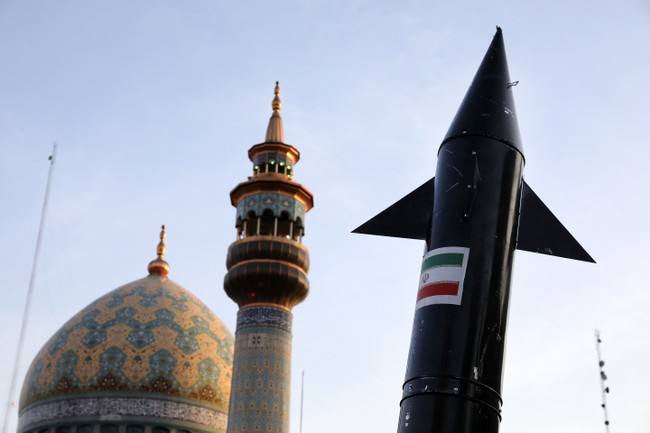We support our Publishers and Content Creators. You can view this story on their website by CLICKING HERE.

Just a few months ago, everything was different. Remember?
Iran was on the warpath. Awash with petro-dollars (and just plain dollars, courtesy of the Biden administration), the Iranian mullahs were clearly the ascending power in their region. Meanwhile, Israel was ravaged by terrorist invaders; their one-proud intelligence services and military were exposed as inadequate. The Iranian proxy militaries surrounding the Jewish homeland (as well as Egypt, Saudi Arabia, and more) kept a gun pointed at their enemies’ heads. This was the New World Order in the Middle East.
Advertisement
America’s allies were on their heels.
Iran thundered in apocalyptic prose: Israel will be destroyed! Death to America! Destroy the infidels! Kill the Jews! The future is ours!
General Ali Fadavi, the deputy commander of Iran’s Revolutionary Guards Corps, smugly told the media, “Iran’s response to the Zionist aggression is definite. We are capable of destroying all that the Zionists possess with one operation.”
At least, Fadavi felt that way on October 31, when he issued that statement. Since then, America had a pretty big presidential election. (You might’ve heard about it.) But if you haven’t, here’s the highlight: The crazy, scary Orange Man is back in the saddle.
And suddenly, Iran’s singing a dramatically different tune.
It was released on Thanksgiving Day, so most people probably didn’t see it, but The New York Times released a fascinating story yesterday: “With Trump Returning and Hezbollah Weakened, Iran Strikes a Conciliatory Tone.”
The sub-header: “As Iran faces domestic and foreign challenges, its bellicose rhetoric on the United States and Israel has given way to signs that it wants less confrontation.”
The contrast is striking: Just weeks earlier, Iran was vowing to utterly eviscerate its enemies. No compromises, no exceptions! And remarkably, the world was largely falling into line: Biden even pressured America’s allies to “respond in proportion” to Iranian missile attacks on civilian targets.
But after Election Day? Even The New York Times noted the Iranian sea change:
Advertisement
In mid-November, Iran dispatched a top official to Beirut to urge Hezbollah to accept a cease-fire with Israel. Around the same time, Iran’s U.N. ambassador met with Elon Musk, as overture to President-elect Donald J. Trump’s inner circle. And on Friday, it will hold talks in Geneva with European countries on a range of issues, including its nuclear program.
Get ready for the money quote:
Five Iranian officials, one of them a Revolutionary Guards member, and two former officials said the decision to recalibrate was prompted by Mr. Trump winning the Nov. 5 election, with concerns about an unpredictable leader who, in his first term, pursued a policy of “maximum pressure” on Iran. [emphasis added]
During the Nixon years, we called it the madman theory: When foreign adversaries cannot predict the actions of a “mad” U.S. president, they’re suddenly risk-adverse. It’s a very old idea: Niccolo Machiavelli wrote in 1517 that sometimes, it’s “a very wise thing to simulate madness.”
But there’s nothing “mad” about it.
All nations make risk-reward calculations. It’s unusual for a country to deliberately court their own destruction; getting deposed, murdered, and your corpse sexually violated isn’t a lot of fun — and the memory of the ex-Libyan strongman is still fresh in the minds of Muslim leaders.
Most foreign leaders have a pretty good quality of life. And so, they want to keep living. It’s awesome to be in charge! Perhaps Mel Brooks said it best:
Advertisement
One of Donald Trump’s greatest strengths is his knowledge and appreciation of leverage. He knows how to use it against others, and he knows what it feels like when it’s wielded against him. For over 50 years, he’s used negotiating leverage to gain concessions and improve his hand in real estate, business, government contracts, politics, and financial loans. It’s fundamental to how Trump sees the world: Life is a deal.
But Joe Biden and the Democratic Party don’t view the world the same way. Life isn’t about brokering deals; it’s about liberal values and utopian ideals. Instead of dealing with countries — like Iran — as they actually are, the Obama-Biden-Harris triumvirate dealt with Iran as they hoped it would one day be: A peaceful, trustworthy nation that surely wouldn’t nuke anyone (or fund terrorism).
And so, he rewarded the mullahs with money. He stymied the Israeli response. He ordered Netanyahu not to attack Hezbollah. He did nothing as the Iranians funded their terrorist proxies, giving them the green light to attack allies and disrupt global commerce.
The Iranians did exactly what you’d expect them to do: They acted in their own self-interest. We gave them an inch; they took a mile.
But no more.
Israel has decimated Hezbollah and Hamas. They opted to ignore Obama-Biden-Harris and handle things on their own. And in the process, they shattered Iran’s hand.
Now, if you’re a Democratic thought-leader, this is a very bad thing: Liberals believe that nations like Iran are motived by insecurity — that all we need to do is let them know we won’t attack ‘em, and they’ll be good little boys and girls. Thus, all the problems in the world are America’s fault… for scaring, intimidating, and bullying other countries.
Advertisement
Flawed worldviews lead to flawed results.
Iran isn’t motivated by insecurity; Iran is motivated by self-interest. When you’re not a superpower, your actions aren’t driven by utopian ideals, but risk-reward calculations: How much can we get away with before the cost is too great?
During the Obama-Biden-Harris years, they read the numbers one way. With Trump, it’s an entirely different calculation.
It’s not just morning again in America: It’s morning again in the Middle East, too.

 Conservative
Conservative  Search
Search Trending
Trending Current News
Current News 







